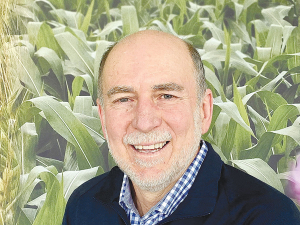Three new grower directors appointed to FAR board
Effective from 1 January 2026, there will be three new grower directors on the board of the Foundation for Arable Research (FAR).
 The conference is the last chance to hear from David Densley in his role as FAR's senior maize researcher.
The conference is the last chance to hear from David Densley in his role as FAR's senior maize researcher.
Artificial intelligence will assist farmers to interpret the huge amounts of data generated using precision agriculture, says a US expert who will speak at a Hamilton maize conference this month.
“We’ve evolved from precision agriculture to digital agriculture,” says Scott Shearer, professor and chair of food, agricultural and biological engineering at Ohio State University.
Organised by the Foundation for Arable Research, the “Maize Profit and Productivity” conference will be held at the Claudelands Events Centre on February 12 and 13.
Speaking on the current and future role of precision agriculture in US maize systems, Shearer, who will present via video link, says “digital agriculture” is broader.
“It covers everything from when the seed goes in the ground until there are end products on the consumer’s table. Everything is connected to the internet.”
Digital agriculture applies artificial intelligence and machine learning (AI/ML) to interpret huge amounts of data to support a farmer’s decision-making and improve the efficiency of farm operations.
FAR technology manager Chris Smith says the biggest challenge for growers adopting precision ag as an everyday tool on farm has been the perceived cost versus the return on investment.
Issues around data transfer and inter-operability between different systems by service providers have also been barriers to adoption.
“Internationally, several countries are trialling new technologies that may provide future precision ag opportunities for New Zealand maize growers,” says Smith.
“Software and hardware developments promise greater and smoother integration of layers of data. AI and machine learning will help greatly with this, and will also provide greater resolution of imagery, draw on large amounts of data for identifying issues like weeds, pests and diseases and the ability to manage them more accurately and cost effectively.
“There are some great opportunities ahead,” Smith says.
The conference is also the last chance to hear from David Densley in his role as FAR’s senior maize researcher. Following the conference, he is leaving FAR to concentrate on his consultancy work.
He will discuss a long-term FAR maize research programme focusing on identifying maize production system practices that lead to higher profitability and better production resilience.
Three grower panels will provide a farmer perspective on the conference’s key themes.
The conference also includes an afternoon at FAR’s Northern Crop Research Site at Tamahere, near Hamilton, where trial work will be discussed.
Former Agriculture Minister and Otaki farmer Nathan Guy has been appointed New Zealand’s Special Agricultural Trade Envoy (SATE).
Alliance Group has commissioned a new heat pump system at its Mataura processing plant in Southland.
Fonterra has slashed another 50c off its milk price forecast as global milk flows shows no sign of easing.
Meat processors are hopeful that the additional 15% tariff on lamb exports to the US will also come off.
Fears of a serious early drought in Hawke’s Bay have been allayed – for the moment at least.
There was much theatre in the Beehive before the Government's new Resource Management Act (RMA) reform bills were introduced into Parliament last week.